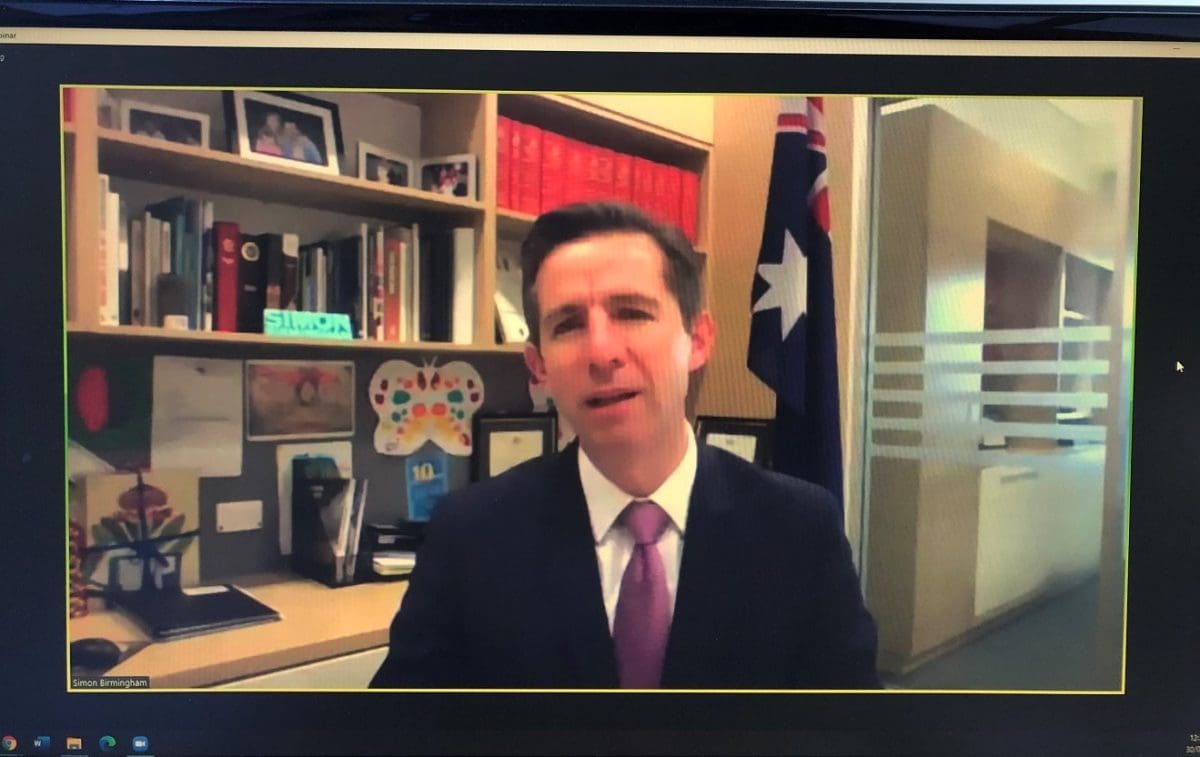
Senator Simon Birmingham: “If there is an economic lesson to be ever mindful of as we come out the other side, it is not to put up barriers and walls and restrict the free flow of trade, goods and services.”
THE “jury is still out” on whether the COVID-19 pandemic will see an increase in international trade barriers and a retreat to protectionism across the globe, according to Minister for Trade, Tourism and Investment, Simon Birmingham.
Addressing the virtual Australian Grains Industry Conference (AGIC) 2020, Senator Birmingham said there had been a rise in nationalistic sentiment and protectionist actions around the world since the pandemic began.
But, it was yet to be seen whether that would translate into actions “that would have long-lasting consequences”.
“Yes, there is a lot of temporary measures (that have been put into place), but also a lot of support for commitments to keep them as temporary measures,” he said.
“I’m hopeful that, working with our many partners, we can convince the rest of the world of the reality which is that the economic strength that has been achieved over recent decades, the rising of hundreds of millions of people out of poverty, and achieving better education, health and standards of living across much of our region has been a result of more open markets and trade. We have achieved greater things coming into this pandemic by opening up to one another.
“If there is an economic lesson to be ever mindful of as we come out the other side, it is not to put up barriers and walls and restrict the free flow of trade, goods and services because that will only lead to greater inefficiencies and a circumstance where getting economic recovery back on track will be so much harder.”
Market diversity
Senator Birmingham said it was particularly important for Australia, given recent issues such as China’s imposition of a tariff on the importation of barley, to champion free trade and pursue new market opportunities.
“The old approach of needing to break down tariffs, quotas and trade barriers remains crucially important to opening up new markets, as we have done with Indonesia and a range of countries as we aspire to do with many others,” he said.
“I have given a call to arms to Austrade, DFAT officials, high commissions and embassies around the world to make sure that, in responding to the challenges the farm sector faces, I expect everyone to be working hard to seize and find new opportunities.”
But Senator Birminham warned that diversifying into new markets was not something that could be achieved overnight.
“That means the sector may see challenges over the next couple of years in terms of being able to shift product at the same premium prices they received into the China market,” he said.
“But with the quality of our product and the reliability of Australian producers I’m confident we can win the contracts, whether that is into the Middle East, Thailand, Vietnam or Singapore, all of which we see as prospective markets.
China tariff
Senator Birmingham downplayed concerns that China’s tariff move on Australian barley was part of a broader political agenda and would likely lead to further restrictions on Australian agricultural products.
“Firstly, we should be very mindful of the fact that the processes that started around the barley anti-dumping dispute were initiated more than 18 months ago. China started its investigations then and it always had a fixed end date. Nobody could have predicted that the fixed end date was going to be in the middle of a global pandemic or a debate about what was going to happen at the world health assembly,” he said.
“I don’t think it is right to join the dots automatically between debate about health matters and the conclusion of the anti-dumping process.”
Senator Birmingham said China had cited, in some cases, Australia’s use of anti-dumping measures in its justification for the barley decision, but he said that was “an erroneous proposition put forward by China”.
“Yes, Australia has used anti-dumping measures, but all the evidence is there for the world to see as to why we have done that in a range of steel products in particular. But China has shown a lack of credible evidence to justify what it has done with our barley industry,” he said.
“That is why we will ultimately proceed, if we have to, with a World Trade Organisation appeal on that position around barley. The same rights and opportunities are there for China in relation to any of the dumping matters we have resolved in Australia about steel and other products. They have not gone down that path at this point in time.”
Hold true to values
Senator Birmingham said when it came to dealing with trade disputes, Australia would continue to pursue a transparent agenda and “hold true to our values”.
“That means that we engage in multi-lateral fora in institutions like the World Health Organisation around what is in Australia’s overall, long term interests,” he said.
“It is in our interests to ensure it is as transparent as it can be inquiring into the pandemic and how we learn the lessons to stop this type of devastation to our economy and people’s lives from happening again. Australians will expect no less.
“We shouldn’t tread down a slippery slope of compromising what we say we will do in relation to our values or our interest just because we think that will appease some other nation. That type of approach only leads to potentially further requests for appeasement.
“We want to see China continue to grow and succeed. We don’t adopt a containment strategy of others.”
Grain Central: Get our free daily cropping news straight to your inbox – Click here

HAVE YOUR SAY